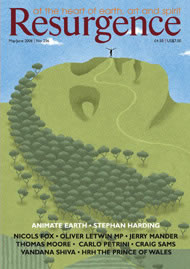THIS BOOK is about the biggest of big pictures: the future of life on this planet and the influence of human activity on that future. Despite its huge scope, it is also full of dense and specific detail about the current state of the Earth and about our impact upon it. It is also a history of the campaign for sustainability as well as a contemporary manifesto.
Jonathon Porritt explains the numerous ways in which we are pushing up dangerously close against the biophysical limits of the planet in terms of resource depletion, pollution of soil, water and air, soil erosion, climate change and population growth.
He also details the intimately linked issues of social injustice and inequity and the major disconnection, in many parts of the Northern world particularly, between increased economic growth and increased happiness.
However, where the author brings his own particular expertise to bear is in examining how it might be possible to convince civil society, businesses and governments of the need for fundamental changes in both values and practices if we are to avoid or at least mitigate disaster.
He points out that as a society we are spectacularly in denial about the fact that we live in a finite world and that we cannot use up natural capital indefinitely without facing terrible consequences. He considers first the extent of this denial, which continues despite copious evidence of the crisis we are creating and despite the added issues of security concerning both reliance on imported fossil fuels and use of nuclear energy. He looks at the enduring attraction of continuous economic growth and at the enormous benefits as well as the costs and “disbenefits” which it brings.
Porritt concludes that capitalism and sustainability are not inherently incompatible with each other, but that capitalism will need to be fundamentally redesigned in accordance both with the demands of the world’s biophysical limits and with social justice if it is to become sustainable.
Among the causes of our present predicament Porritt suggests are ignorance, promoted by a largely complacent and prejudiced media; the fact that we are still dazzled by the remarkable achievements of economic growth and of science; and, crucially, the weakness of governments in confronting global problems.
He also discusses the failure of the environmental movement to move beyond single-issue and to engage with all of us on the level of values and beliefs. To justify his optimism, he cites examples of best practice in business, motivated both by a desire to benefit from obvious savings and by additional ethical factors. He also cites the huge number of people throughout the world who in many ways demonstrate that their values include a recognition of the interdependence of all life.
Finally, Porritt reminds us of the crucial role of education in broadening and deepening our understanding of sustainability and of its underlying values.
This book leaves no doubt that we cannot carry on with business as usual without creating devastating consequences during the course of this century. It also argues that there is no alternative to working broadly within existing structures, while moving rapidly towards sustainability. Porritt sketches out in considerable detail how sustainable capitalism would work and what values and imperatives would underpin it. Will that vision become reality? It is no exaggeration to say that there can hardly be a more important question for the world today, but there is, of course, no way to answer it with certainty. There is no doubt, however, that this book brilliantly frames the debate that we must all have, and we must hope that it receives the widest possible attention.
James Sainsbury is an Associate Editor of Resurgence.
Jonathon Porritt will be speaking at the Gaia Lectures at the Hay Festival at 5.30pm on 2nd June. For further information:
www.gaiacooperative.org tel:0845458 4718






